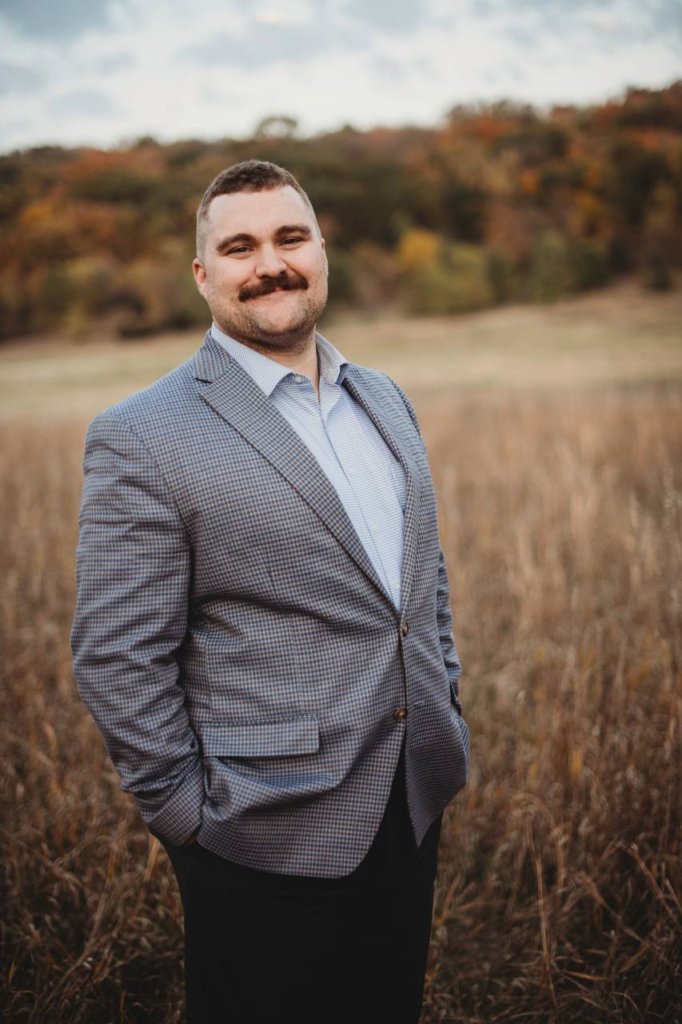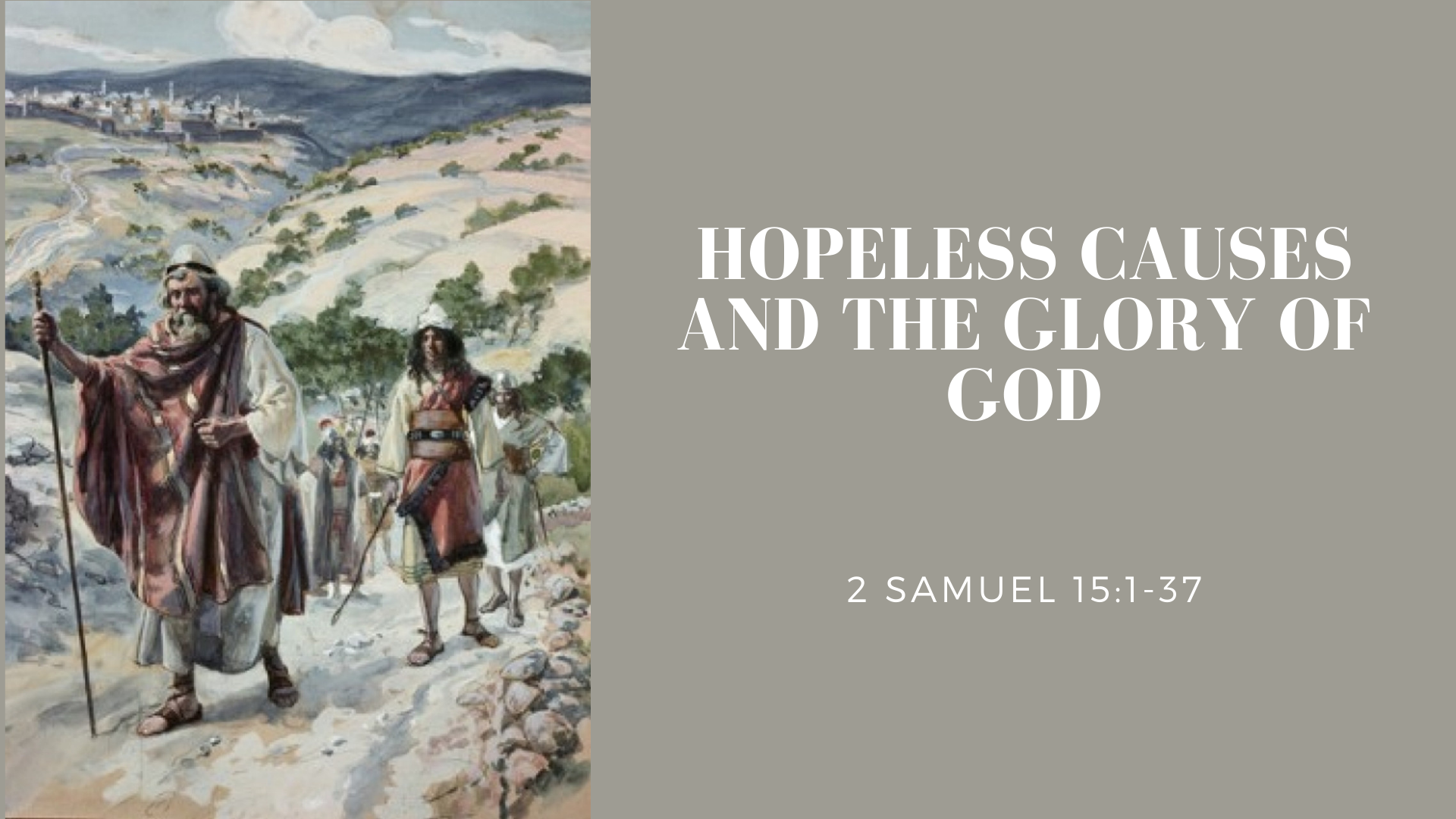Introduction
We live in an age of constant despair. It seems for so many that things are bad and will never get better. But these are circumstances that God does not leave us in. He takes us down to the depths to lead us out.
This is so often the case throughout the Bible and it is the case for David in 2 Samuel 15.
David has welcomed his murderous son Absalom back home and back into the court. He has forgiven him and restored him. But David’s kindness is about to be abused. His son plots David’s overthrow and leads a coup against him. David is forced into exile. All appears to be lost. David reaches a new low point in his reign and in his life. But great defeats are not always what they seem. God uses them for His own purposes and He never leaves His people in them forever. The very same thing is true here if you have eyes to see it.
15 After this it happened that Absalom provided himself with chariots and horses, and fifty men to run before him. 2 Now Absalom would rise early and stand beside the way to the gate. So it was, whenever anyone who had a lawsuit came to the king for a decision, that Absalom would call to him and say, “What city are you from?” And he would say, “Your servant is from such and such a tribe of Israel.” 3 Then Absalom would say to him, “Look, your case is good and right; but there is no deputy of the king to hear you.” 4 Moreover Absalom would say, “Oh, that I were made judge in the land, and everyone who has any suit or cause would come to me; then I would give him justice.” 5 And so it was, whenever anyone came near to bow down to him, that he would put out his hand and take him and kiss him. 6 In this manner Absalom acted toward all Israel who came to the king for judgment. So Absalom stole the hearts of the men of Israel.
7 Now it came to pass after forty years that Absalom said to the king, “Please, let me go to Hebron and pay the vow which I made to the Lord. 8 For your servant took a vow while I dwelt at Geshur in Syria, saying, ‘If the Lord indeed brings me back to Jerusalem, then I will serve the Lord.’ ”
9 And the king said to him, “Go in peace.” So he arose and went to Hebron.
10 Then Absalom sent spies throughout all the tribes of Israel, saying, “As soon as you hear the sound of the trumpet, then you shall say, ‘Absalom reigns in Hebron!’ ” 11 And with Absalom went two hundred men invited from Jerusalem, and they went along innocently and did not know anything. 12 Then Absalom sent for Ahithophel the Gilonite, David’s counselor, from his city—from Giloh—while he offered sacrifices. And the conspiracy grew strong, for the people with Absalom continually increased in number.
13 Now a messenger came to David, saying, “The hearts of the men of Israel are with Absalom.”
14 So David said to all his servants who were with him at Jerusalem, “Arise, and let us flee, or we shall not escape from Absalom. Make haste to depart, lest he overtake us suddenly and bring disaster upon us, and strike the city with the edge of the sword.”
15 And the king’s servants said to the king, “We are your servants, ready to do whatever my lord the king commands.” 16 Then the king went out with all his household after him. But the king left ten women, concubines, to keep the house. 17 And the king went out with all the people after him, and stopped at the outskirts. 18 Then all his servants passed before him; and all the Cherethites, all the Pelethites, and all the Gittites, six hundred men who had followed him from Gath, passed before the king.
19 Then the king said to Ittai the Gittite, “Why are you also going with us? Return and remain with the king. For you are a foreigner and also an exile from your own place. 20 In fact, you came only yesterday. Should I make you wander up and down with us today, since I go I know not where? Return, and take your brethren back. Mercy and truth be with you.”
21 But Ittai answered the king and said, “As the Lord lives, and as my lord the king lives, surely in whatever place my lord the king shall be, whether in death or life, even there also your servant will be.”
22 So David said to Ittai, “Go, and cross over.” Then Ittai the Gittite and all his men and all the little ones who were with him crossed over. 23 And all the country wept with a loud voice, and all the people crossed over. The king himself also crossed over the Brook Kidron, and all the people crossed over toward the way of the wilderness.
24 There was Zadok also, and all the Levites with him, bearing the ark of the covenant of God. And they set down the ark of God, and Abiathar went up until all the people had finished crossing over from the city. 25 Then the king said to Zadok, “Carry the ark of God back into the city. If I find favor in the eyes of the Lord, He will bring me back and show me both it and His dwelling place. 26 But if He says thus: ‘I have no delight in you,’ here I am, let Him do to me as seems good to Him.” 27 The king also said to Zadok the priest, “Are you not a seer? Return to the city in peace, and your two sons with you, Ahimaaz your son, and Jonathan the son of Abiathar. 28 See, I will wait in the plains of the wilderness until word comes from you to inform me.” 29 Therefore Zadok and Abiathar carried the ark of God back to Jerusalem. And they remained there.
30 So David went up by the Ascent of the Mount of Olives, and wept as he went up; and he had his head covered and went barefoot. And all the people who were with him covered their heads and went up, weeping as they went up. 31 Then someone told David, saying, “Ahithophel is among the conspirators with Absalom.” And David said, “O Lord, I pray, turn the counsel of Ahithophel into foolishness!”
32 Now it happened when David had come to the top of the mountain, where he worshiped God—there was Hushai the Archite coming to meet him with his robe torn and dust on his head. 33 David said to him, “If you go on with me, then you will become a burden to me. 34 But if you return to the city, and say to Absalom, ‘I will be your servant, O king; as I was your father’s servant previously, so I will now also be your servant,’ then you may defeat the counsel of Ahithophel for me. 35 And do you not have Zadok and Abiathar the priests with you there? Therefore it will be that whatever you hear from the king’s house, you shall tell to Zadok and Abiathar the priests. 36 Indeed they have there with them their two sons, Ahimaaz, Zadok’s son, and Jonathan, Abiathar’s son; and by them you shall send me everything you hear.”
37 So Hushai, David’s friend, went into the city. And Absalom came into Jerusalem.
Absalom’s Conspiracy (15:1-12)
Absalom gets chariots and men to run with him. What is he doing here? In our modern political terms, he is forming an exploratory committee. He is dressing for the job he wants, not the job he has. He’s plotting to make himself king. And not only that he puts himself in between the people and the king. He both wants to present himself as a good judge that will listen to the people and present his father as a faithless, unjust ruler who doesn’t care about them. And you see that he subtlety exploits the tribal divisions already inherent in Israel. And what is the result of all this? He stole the hearts of all Israel. He slanders his father. And flatters the people.
On what appears to be Absalom’s 40th birthday, he asks David to allow him to go to Hebron, David’s Judahite home base of support, to pay a vow that he had made. David allows him to. Absalom then sent men throughout Israel to proclaim that he was taking over in Hebron. Absalom also invited 200 noblemen from Jerusalem to Hebron who had no idea what was going on to make it look like they were on his side of the coup once it was declared.
Having the nobility in your camp is like taking the radio or TV station first in an African coup, or exercising total control over social media in recent years here. The point is to make it look like you have much more support than you do so that the opposition to the coup will melt. On top of the appearance of great support, Absalom gains Ahithophel the Gilonite who was Bathsheba’s grandfather. And more and more people continued to join Absalom.
David in Exile (13-37)
David is told of what was occurring. He immediately decides the course of action. They are going to flee the city. This is the most courageous thing David has done since his sin with Bathsheba. It might not seem like courage to flee. You might be thinking “He’s running away! How is that courageous?” But think about it. David understands that he could hole up in the city, Absalom would come with an army and lay siege. Hundreds or thousands of people would die of starvation, of disease, and from warfare, including women and children and elderly people. Even though he might have the upper hand militarily—Jerusalem is a very defensible city with a water supply—and still a lot of support among his people, David wants to avoid this happening. So rather than causing the people to suffer for him, he chooses to suffer for his people. He makes himself a fugitive yet again.
David packs up his household, but leaves ten unnamed unendowed wives behind. This tells us just how much he has disobeyed Deuteronomy 17:17 where kings are not allowed to multiply wives. But it also shows that David wants them to remain to manage the household in his absence. He is going into exile, but the kingdom will still remain and function with a skeleton crew.
Then we are given a reminder of David’s faithfulness as a true Israelite. Israel was to be a priest to the nations. And here many foreigners had become loyal to David and to David’s God. Philistines had forsaken their gods for the Lord because of David’s faithfulness. And David tells them to return home, like Naomi told Ruth to return. But Ittai the leader of the Gittite Philistines refused. They are going to follow David to the death. They crossed the Brook Kidron, the border of Jerusalem and began to enter the wilderness to the east. The people wept as they went into exile.
Zadok and the Levites appear with the ark. David tells them to keep the ark in the city where it belonged. The ark had left the land, and God had gone into exile before at the very beginning of 1 Samuel. David did not want to see that happen. Instead David would be the one going into exile instead. David is Israel. And Israel is going into exile instead of Israel’s God this time.
David continued east. East is the direction of exile. Cain was exiled from Eden to the east. Later Israel would be exiled to the east in Babylon. David here is a typological preview of what Israel’s fate would be many generations from now. He is living it out for them. He covers his head, goes barefoot and weeps. There he is told of Ahithophel’s betrayal. And there he prays that God would turn his wise counsel into foolishness. As he prays, his friend Hushai appears. David tells him to return to the city and defeat Ahithophel’s counsel, and to be a spy in Absalom’s camp, to tell everything you hear to the Zadok and Abiathar. So Hushai returns. And Absalom takes over Jerusalem.
Conclusion
What is going on in this story? If you have eyes to see it, it is not just a typological preview of Israel going into exile, but it is also a preview of Jesus’s crucifixion. Jesus follows the very same pattern. He leaves Jerusalem, the temple, and travels up the Mount of Olives, where the Garden of Gethsemane is. David is betrayed by Ahitophel who later hangs himself. Jesus is betrayed by Judas who later hangs himself. In the next chapter, many of David’s friends like Mephibosheth in the next chapter appear to abandon him. Jesus’s friends, the disciples abandon him. David is taunted in the next chapter by Shimei. Jesus is taunted on the cross by the Jews.
This exile of David is pointing forward to the cross. The similarities here are obvious once you see them. The cross is a kind of exile. It is the final and greatest form of exile. All the exile episodes in the Bible point toward this, the true king being exiled from His people and suffering on their behalf. And the story of the crucifixion ends with God’s enemy’s rejoicing. They think they have won. The disciples despair. They believe all is lost. If the story ended there, it would seem dismal indeed. If the story of David ended here it would seem like a disaster. All is lost. It’s over.
But this is that is what we have to see more than anything else. This is how God conquers through these means. He disguises His greatest victories as defeats. That is what Christ’s death was! If the rulers of this world knew what they were doing they would not have killed the Lord of glory, says the Apostle Paul. David and Israel are brought low in this episode as well. But it is not over. God is moving to establish His kingdom and secure it. The highest point in Israel is just around the corner. The reign of Solomon is near, but there would be no reign of Solomon with Absalom standing in the way. God is removing Absalom in this very painful, very difficult way.
So when you look to our day and the state that the church is in, how decrepit and unfaithful and apostate we have become, it can easily become a moment where you give in to despair. Where you go barefoot weeping like David on the Mount of Olives. But we do not know precisely what God is doing. But we do know the patterns that He follows. Things look bad. Things look like they are over. But it is precisely in moments like these where God’s glory shines forth the brightest. We do not know glory lies around the corner. We do not know what resurrection lies behind the death we are seeing. But we do know that that is how God operates consistently.
So the charge to you is this, to not look at our conditions with the eyes of man. To despair. To become hopeless. We must look at things with the eyes of faith. That God has not abandoned His people. That He will lead us out of the wilderness. He puts us in these positions to force us to trust in Him alone. So trust Him. Trust that whatever He is doing, it is good and for our good. Trust in the Lord. Trust that He will lead us from glory to glory.
In the name of the Father, the Son, and the Holy Spirit. Amen!

Andrew Isker is the pastor of 4th Street Evangelical Church in Waseca, MN. He is a graduate of Minnesota State University and Greyfriar’s Hall Ministerial Training School, and he has served churches in Missouri, West Virginia, and Minnesota. He is the author (with Andrew Torba) of Christian Nationalism, and the author of the forthcoming book, The Boniface Option. Andrew, his wife Kara, and their five children reside in his hometown of Waseca, MN. He can be found on Gab @BonifaceOption.





